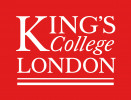© Pint of Science, 2024. All rights reserved.
Do you like experiments? Are you comfortable in a pub? We'll combine the two!
What they say about us:
- “Not only entertaining but deeply insightful” -- The new Londoner
- “Mind blowing, reality bending, life changing experience” -- London Eye Times
- “A combination of experiment, colors and beer: it’s a sure win” -- bestshowintown.co.uk
This event is also supported by the department of Physics, King's College London.
What they say about us:
- “Not only entertaining but deeply insightful” -- The new Londoner
- “Mind blowing, reality bending, life changing experience” -- London Eye Times
- “A combination of experiment, colors and beer: it’s a sure win” -- bestshowintown.co.uk
This event is also supported by the department of Physics, King's College London.
Physics: One pint short of a barrel?
Katy Clough
(Research student)
Am I crazy, or is it the Universe?
A lot of modern physics sounds like science fiction, with its talk of invisible ‘dark matter’ particles, curved space-times and quantum phenomena. So when physicists get a letter from someone proposing a radical new theory, how do we know if this person is crazy, or a genius? In this talk Katy Clough will explain why physics requires that one sets aside the intuition of everyday experience, although this is not equivalent to having the freedom to imagine any possible theory.
A lot of modern physics sounds like science fiction, with its talk of invisible ‘dark matter’ particles, curved space-times and quantum phenomena. So when physicists get a letter from someone proposing a radical new theory, how do we know if this person is crazy, or a genius? In this talk Katy Clough will explain why physics requires that one sets aside the intuition of everyday experience, although this is not equivalent to having the freedom to imagine any possible theory.
Experimental science at home (in the pub)
William Wardley
(Research student)
There are dozens of great experiments you can do with stuff you can find around home. But we're not at home, we're in the pub! Using "equipment" and "chemicals" begged, borrowed and stolen from behind the bar we will perform experiments that show interesting effects from physics and chemistry that have ramifications in fields as varied as climate science, radio engineering and pyrotechnics.
Seeing is believing – how to take pictures in astronomy and microscopy by detecting individual photons
Klaus Suhling
(Professor of Experimental Biophysics & Nanotechnology)
The smallest possible amount of light is a photon, and photon counting imaging is a very sensitive method to take pictures at very low light levels. I will show how this method was used in the Hubble Space Telescope and is now used in fluorescence microscopes. It helps us to see what otherwise is difficult to see, for example in the life sciences, and it turns that photon counting imaging is a very useful method indeed.
Map data © OpenStreetMap contributors.

